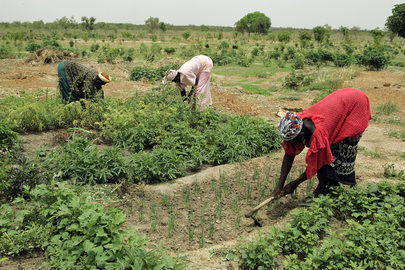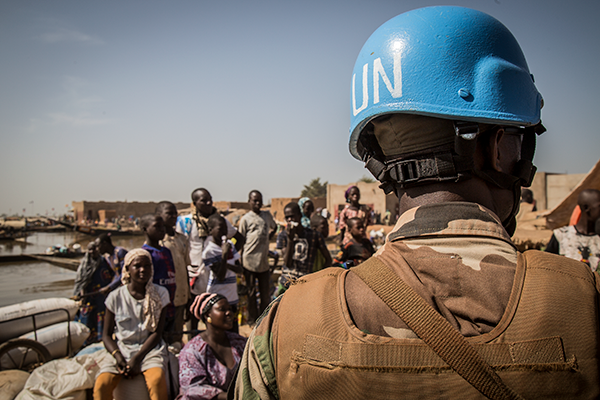Integrating peace into development and humanitarian work: Interpeace launches Peace Responsiveness Facility

Interpeace is delighted to announce the launch of the first international Peace Responsiveness Facility in June 2020. The Facility will provide expert advice and develop practical field work with international organizations – including UN bodies such as the FAO, WHO, UNICEF and others – to ensure that future development and humanitarian policy, as well as field activities worldwide, are better equipped to identify conflict risks and to contribute to long-term peace.
After successfully trialing ‘peace responsiveness’ from 2017 to 2020 with several specialized agencies, as well as practical fieldwork in the Democratic Republic of Congo and Somalia, the concept is now being scaled-up to a full Facility which is funded for the next three years.
Despite the fact that over 80% of humanitarian and development work is carried out in contexts of violent conflict, many organizations acknowledge that their actions are insufficiently adapted to those complexities. As a result, humanitarian and development interventions in such settings are less sustainable and miss crucial opportunities to contribute to peace and ending need.
To assist international organizations in seizing those opportunities, Interpeace has launched its Peace Responsiveness Facility (PRF). The Facility supports organizations operating in conflict-affected or fragile settings in designing and implementing programmes that not only achieve technical outcomes such as food security and health interventions among others, but that contribute to enhancing peace at the same time.
“COVID-19 has made it even more urgent for development, humanitarian and peacebuilding organizations to work together, mitigate critical humanitarian needs and address pressing underlying conflicts. The Peace Responsiveness Facility will support translating this way of working into practice,” said Scott Weber, President of Interpeace.
The Facility, which Interpeace has piloted for years, will play a vital role in facilitating learning on how the COVID-19 pandemic interacts with peace and conflict dynamics as well as providing policy and programmatic guidance for peace responsive COVID-19 interventions.
“COVID-19 is affecting relationships in communities as well as between communities and governments and we need to plan together with international organizations, a peace responsive approach mitigating these effects,” said Martina Zapf, Senior Manager at Interpeace.
Peace responsiveness is an approach to the Humanitarian-Development-Peace Nexus enabling all interventions undertaken within different sub-sectors to ultimately contribute to social cohesion and trust in state-society relationships.
The Facility will involve joint programmatic efforts on the ground, with Interpeace and partner organizations working together for locally owned, sustainable, and peace-oriented humanitarian and development activities.
“Interpeace’s role is to assist the international community – especially the UN – to improve peacebuilding through its innovative thought leadership, and to deliver practical peacebuilding on the ground. We had achieved a proof of concept that ‘peace responsiveness’ works, and the new Facility will now create lasting change in the international system and in people’s lives,” Scott Weber added.

Photo credits: UN Photo/Gema Cortes
The Peace Responsiveness Facility will develop new partnerships and also build on Interpeace’s previous and current work with partners such as the Food and Agriculture Organization (FAO), the International Federation of Red Cross and Red Crescent Societies (IFRC), International Labor Organization (ILO), the Peacebuilding Support Office (PBSO), the United Nations Children’s Agency (UNICEF), and the World Health Organization (WHO).
“We are starting to see the impact our peace responsive work can have. Our work with FAO and other partners is testimony,” said Martina Zapf. “Interpeace has worked with agencies like the FAO to identify good practices and put in place methods that enable programmes to systematically identify and seize opportunities to contribute to peace,” she explained.
The facility supports humanitarian, development, and stabilization organizations to play a more effective role in also supporting peace efforts around the world.
“As the current chair of the UN Peacebuilding Commission and a candidate for the UN Security Council in 2021-2022, I am proud of Canada’s ongoing commitment to promote integrated responses to conflict. We are therefore delighted to support the Peace Responsiveness Facility, building on the important work Interpeace has done to support all pillars of the UN system in analyzing and responding to risks of conflict,” said Marc-André Blanchard, Ambassador and Permanent Representative of Canada to the United Nations in New York.
Our partner FAO has welcomed the creation of the Peace Responsiveness Facility at Interpeace with support from the Government of Canada, to respond to a multitude of interventions beyond health, livelihoods, and food security among others.
“FAO and Interpeace have partnered since 2017 to better address and prevent conflict, particularly in those contexts most affected by food crises. Together we have developed and tested tools enabling more systematic and intentional conflict-sensitive programming, strengthening our internal capacities and processes, and helping FAO better understand how we can contribute to local peace impacts,” explained Dominique Burgeon, Strategic Programme Leader – Resilience Director, Emergency and Resilience Division at FAO.
He added: “This kind of support is at the heart of this new Facility, helping agencies like FAO play a more effective role in supporting efforts that contribute to sustaining peace. Support like this will be essential for the Humanitarian-Development-Peace nexus approach to be made a programmatic reality.”
Interpeace has also supported efforts by organizations responding to the Ebola epidemic in the Democratic Republic of Congo (DRC). It designed and supported community engagement which allowed international actors to better understand community concerns and adapt their technical interventions to create greater trust and better humanitarian and development outcomes. It is key that lessons learned in the context of the Ebola response in conflict affected contexts are considered for COVID-19. In this vein, the launch of our Peace Responsiveness Facility is timely.
Special thanks to our Partner, the Government of Canada for supporting the Facility.
